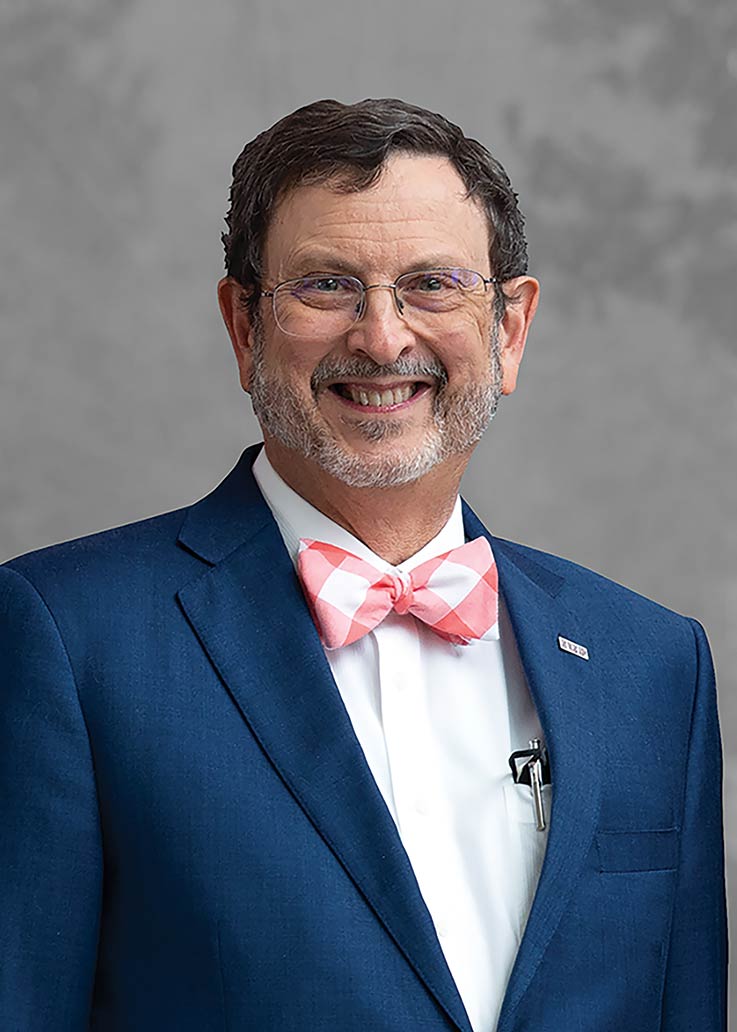 Indiana University of Pennsylvania President Michael Driscoll is recognized as one of the commonwealth’s 50 top leaders in Pennsylvania by City & State Pennsylvania.
Indiana University of Pennsylvania President Michael Driscoll is recognized as one of the commonwealth’s 50 top leaders in Pennsylvania by City & State Pennsylvania.
The recipients are 50 of Pennsylvania’s most prominent and accomplished leaders in government, business, and media over the age of 50 who continue to make a positive impact on Pennsylvania through their achievements, leadership abilities, philanthropic efforts, and dedication to the betterment of Pennsylvania.
The recipients were recognized in the November 27 issue of the publication and were honored at an awards ceremony held November 28 in Philadelphia.
“As the accomplishments of these commonwealth change-makers show, the fundamentals of a career with enduring impact haven’t changed: relationship-building, professionalism, civic responsibility, and vision,” editors said of the honorees.
“The IUP Council of Trustees, and most people affiliated with IUP, already know what a dynamic and visionary leader Dr. Driscoll is for this university,” IUP Council of Trustees Chairman Sam Smith said. “This recognition from people outside of the IUP family is greatly appreciated, fully deserved, and a reaffirmation of the outstanding leadership by President Driscoll that we see every day.”
In addition to the 2023 honorees, five lifetime achievement honorees were recognized during the ceremony: Tom Wolf, former governor of Pennsylvania; Grace Cavelo-Rustia, associate state director, AARP Pennsylvania; Pat Halpin-Murphy, president and founder, Pennsylvania Breast Cancer Coalition; Robert Jubelirer, former senator and lieutenant governor of Pennsylvania; and Lynette Brown-Sow, president of LM Brown Management Group LLC.
Driscoll began his tenure as president of IUP in July 2012. He is the longest-serving president in Pennsylvania’s State System of Higher Education.
In fall 2021, IUP restructured its academic colleges and programs as part of the university’s ongoing work to create a more sustainable and more student-centered university. Both IUP NextGen and the 2020–25 strategic plan focus on leveraging IUP’s strengths as a doctoral research university and its commitment to involving students in meaningful faculty research.
In recognition of the university’s research commitment and success, IUP has been ranked as an R2 Doctoral University–High Research Activity (R2) by the National Center for Postsecondary Research’s 2021 Carnegie Classification.
IUP is one of only two public universities in Pennsylvania and one of only 93 public universities with this ranking in the United States. More than 3,900 colleges and universities are included in the ranking system.
President Driscoll's own academic research while a faculty member at Portland State University recently resurfaced as the 2020 SIGMICRO Test of Time award winner. This is the highest honor the organization gives an academic paper, recognizing that its influence is still felt 18 to 22 years after the paper’s initial publication in a prior session of the International Symposium on Microarchitecture.
In addition to reducing tuition to create more affordability for students and families, President Driscoll announced the Student Success Infrastructure in spring 2022 and launched the program in fall 2023. This initiative provides proactive, direct support to every IUP student at every level. This builds upon existing resources, including the University College, established in 2019 under his direction.
President Driscoll also has prioritized diversity and outreach, establishing a National Achievement Scholarship Office in 2019 and cultivating an international student population that is now the largest within the State System of Higher Education.
IUP opened a Military and Veterans Resource Center in 2014 to assist veterans, active military personnel, and their family members in achieving their educational goals. President Driscoll established the center, in part, after research by a team of faculty members and students concluded that veterans successfully assimilate into civilian life and the college experience with unique support. Since the establishment of the Center, IUP has increased the enrollment of veterans and military-affiliated students by almost 70 percent. In the last several years, IUP has hosted more than 900 of these students.
After extensive discussions with community leaders, alumni, legislators, internal constituencies, and the Pennsylvania State System, President Driscoll secured the approval of the IUP Council of Trustees in December 2022 to begin exploration of the development of a college of osteopathic medicine at IUP. This initiative is poised to address the critical shortage of primary health care physicians in Pennsylvania, especially in rural areas.
The impact of his leadership also includes a series of successful fundraising and capital projects, including the Imagine Unlimited comprehensive fundraising campaign that resulted in $81 million raised, exceeding both the original goal and the target deadline; the opening of John and Char Kopchick Hall, the university’s $90-million science building; completion of Jane E. Leonard Hall, IUP’s $30-million humanities center (the first new academic building at IUP in 20 years); and a $37-million dining facilities project.
In 2014, President Driscoll formed the Indiana Area Collaborative Team to strengthen IUP’s relationship with the local community, including government and business leaders and law enforcement agencies. The team initially helped address unsanctioned and out-of-control gatherings in the community. Now, it serves as a base for additional collaborative projects.
President Driscoll's interest in community partnerships is also reflected in his work as past chair of the American Association of State Colleges and Universities’ Committee on Economic and Workforce Development. He played a lead role in writing a statement about the economic importance of universities in their home regions.
Before his arrival at IUP in 2012, President Driscoll served as the executive vice chancellor and provost of the University of Alaska–Anchorage, a position he took after serving in various posts at Portland State University in Oregon. He earned his PhD in 1988, his MS in 1985, and his BS in 1983, all in electrical engineering at Michigan State University.